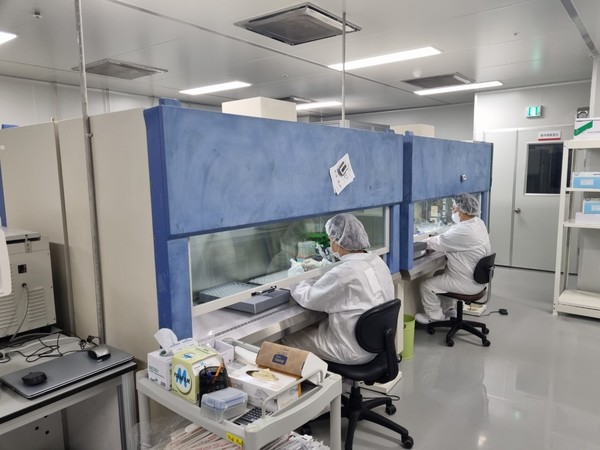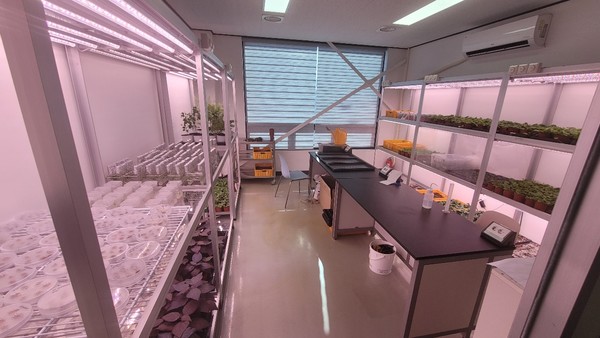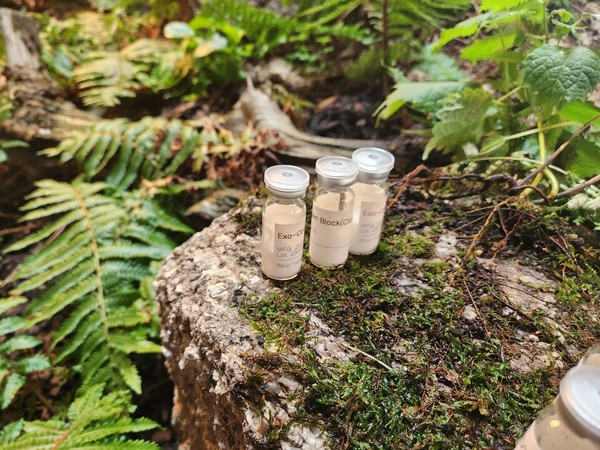Unleashing the Power of Plant Exosomes:
Pioneering the Future of Sustainable Derma-Cosmetics

[Senmoney=Philip Cho] Stepping into uncharted territory can be a lonely and challenging task, says Si-jun Park, the CEO of the promising biomaterials company, ABIO MATERIALS. However, ABIO MATERIALS' dedication to researching the potential of exosomes in the derma-cosmetic industry has paid off, making it a crucial player in this rapidly evolving sector within just two and a half years since its inception in 2020.
ABIO MATERIALS has ventured into the study of #Exosomes, an area still unfamiliar to many. These cell-derived entities act as intercellular communicators and are found in every life form, including humans, animals, microorganisms, and plants. Among these, #PlantExosomes have recently garnered attention in the derma-cosmetic and aesthetic medicine sector for their excellent biocompatibility and safety profile. ABIO MATERIALS, leading the charge, has managed to isolate and purify exosomes from various life forms, thereby establishing an unparalleled global reputation as a specialist exosome company.

A key differentiator for ABIO MATERIALS is its patented EXOTRACTION technology, which ensures 100% purity in exosome separation. This technology uses the chemical properties of phospholipids—compounds that form the exosome's surface, providing a more reliable method than the traditional Tangential Flow Filtration (TFF) filter method.
The company’s innovation hasn’t stopped there; they hold patents for a total of 21 plant exosomes and, along with collaborative ventures, boasts over 40 patents globally. This extensive patent portfolio has positioned them as global leaders in plant exosome patents, attracting attention from global entities and validating their claim to having "the world's most extensive plant exosome lineup".
The cosmetic industry is primed for growth, with a focus on human-derived and plant-derived exosomes. While human-derived #Exosomes are making their mark in the hospital and aesthetic markets, #PlantExosomes are being hailed as the future in mainstream #Cosmetics. The market for these plant secondary metabolites is projected to reach a staggering 22 trillion Won, presenting an enormous opportunity for ABIO MATERIALS.

Recognizing the environmental implications of secondary metabolite extraction, ABIO MATERIALS is focusing on plant exosomes, the primary metabolites, maintaining its commitment to environmental sustainability. With the ambition of securing around 3% of the vast 22 trillion Won market, the company's eco-friendly exosome extraction methods are set to make waves, not only domestically but also in foreign markets like Europe.
ABIO MATERIALS’ partnerships with companies like Amore Pacific, Shinsegae International, Dermafirm, and the Korea Functional Cosmetics Research Center in Korea, and collaborations in Japan, China, and France, have been pivotal in its growth. Its recent acquisition of Korea's largest factory dedicated to producing stem cell culture fluids and products is indicative of the company's aggressive expansion strategy, pointing towards a more prominent market presence.
The journey hasn’t always been smooth sailing, recalls CEO Park. The technology was foreign to many in Korea initially, but ABIO MATERIALS’s continued investment in research and development has allowed it to secure a strong foothold in the sector. The company’s vast range of #SkinBooster products using their exosome technology and LNP stabilization techniques are a testament to their commitment to innovation.
In an ever-growing cosmetic market, ABIO MATERIALS is perfectly positioned to leverage its pioneering work in exosome technology. Its dedication to sustainable practices and relentless investment in technological advancements ensures that this small but robust enterprise will continue to shape the future of the derma-cosmetic industry.
<EOA>

<Translate into Chinese from Original article>
"植物外泌体,皮肤护理化妆品的未来:ABIO MATERIALS有限公司的旅程"
进入未知领域可能是孤独且充满挑战的任务,ABIO MATERIALS公司的CEO朴思俊说。然而,ABIO MATERIALS对研究皮肤护理化妆品行业中外泌体潜力的致力,已经取得回报,使其在自2020年成立仅两年半的时间内,成为该快速发展领域的关键参与者。
ABIO MATERIALS进入了许多人仍然陌生的#外泌体的研究领域。这些细胞衍生的实体作为细胞间的通信者,并且在每种生命形式中都可以发现,包括人类,动物,微生物和植物。其中,#植物外泌体最近在皮肤护理化妆品和美容医学领域引起了关注,因为它们的生物相容性和安全性极佳。带头的ABIO MATERIALS已经设法从各种生命形式中分离和纯化外泌体,从而在全球范围内建立了无可匹敌的外泌体专家公司的声誉。
ABIO MATERIALS的关键区别在于其专利的EXOTRACTION技术,确保了外泌体分离的100%纯度。该技术使用磷脂的化学性质 - 组成外泌体表面的化合物,比传统的切向流过滤(TFF)过滤方法更可靠。
该公司的创新并未止步于此; 它持有21种植物外泌体的专利,与合作企业一起,在全球拥有40多项专利。这个庞大的专利组合将他们定位为全球植物外泌体专利的领导者,引起了全球实体的关注,并证明了他们“拥有全球最广泛的植物外泌体产品线”的声明。
化妆品行业准备好增长,重点关注人源性和植物源性外泌体。人源性#外泌体在医院和美容市场上留下了痕迹,而#植物外泌体被誉为主流#化妆品的未来。这些植物二级代谢物的市场预计将达到惊人的22万亿韩元,为ABIO MATERIALS提供了巨大的机会。
ABIO MATERIALS认识到二级代谢物提取的环境影响,正专注于植物外泌体,这是主要代谢物,坚持对环境可持续性的承诺。朴CEO表示雄心壮志,希望在巨大的22万亿韩元市场中获得大约3%的市场份额。公司的环保外泌体提取方法预计将在欧洲等海外市场引起关注。
ABIO MATERIALS与韩国的Amore Pacific,Shinsegae International,Dermafirm和韩国功能化妆品研究中心等公司的合作,以及在日本,中国和法国的合作,对其增长至关重要。它最近收购了韩国最大的专门用于生产干细胞培养液和产品的工厂,这表明了该公司积极的扩张策略,指向更突出的市场地位。
朴CEO回忆说,这个旅程并不总是一帆风顺。最初,这项技术在韩国还很陌生,但ABIO MATERIALS通过创建竞争优势,不断投资于技术和创新,使其在该领域成为强大的小型企业。该公司的广泛范围的#皮肤促进剂产品使用他们的外泌体技术和LNP稳定技术,这是他们对创新承诺的证明。
在不断增长的化妆品市场中,ABIO MATERIALS完全有条件利用其在外泌体技术方面的开创性工作。它对可持续实践的坚定承诺以及对技术进步的无情投资,确保这个小而强大的企业将继续塑造皮肤护理化妆品行业的未来。
<EOA>

